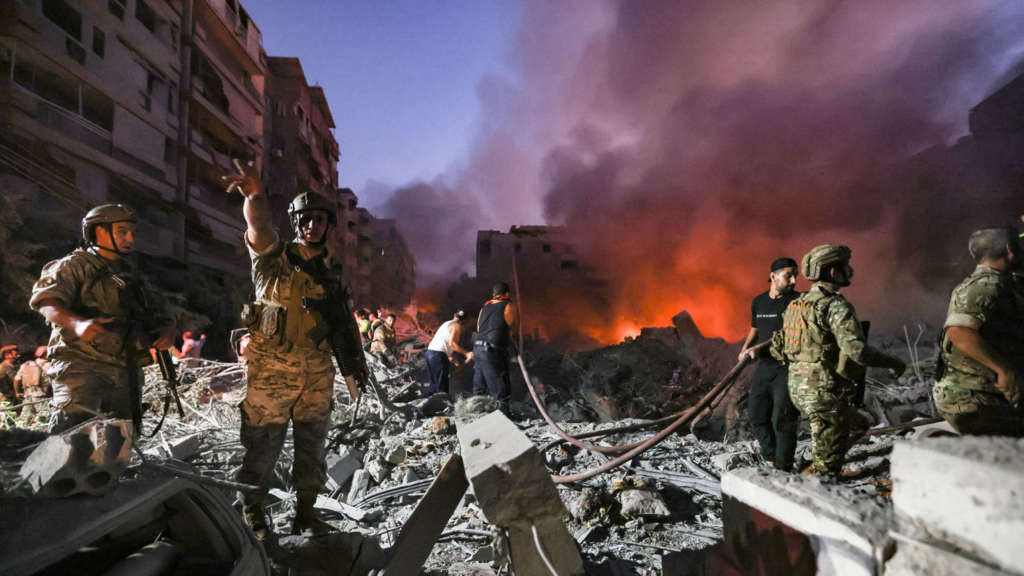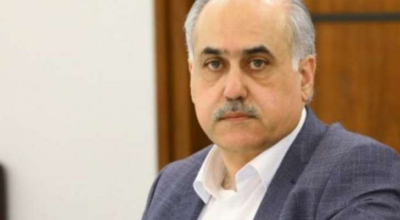MP Hadi Abu Al-Hassan, a prominent member of the “Democratic Gathering” Parliamentary bloc who represents the Metn district of Mount Lebanon blasted Iran’s interference in the ceasefire talks and pointed out that there are only 2 countries that are mediating the talks, the US and France stressing that Iran is not a mediator but s interfering as a negotiating party which we completely reject
In an interview with LBC, he said that the trucks that were loaded with weapons and were confiscated in the Aley district are now in the hands of the army and called on everyone to remain calm
He stressed that Ali Larijani the advisor to the Supreme Leader in Iran, Ali Khamenei did not come as a mediator to Lebanon but as an intervener and enough interference in our affairs and the affairs of the Lebanese people,” stressing that “appeasement is no longer useful and it is time to raise the national interest because Lebanon is at a crossroads.”
He stressed in the interview: “We must preserve our borders in full and our national unity and it is time for all the Lebanese people to remain calm.” He considered that “France and the United States are mediators, while Iran does not intervene as a mediator but as a party to the negotiation, and it wants to guarantee its role in the region and arenas.”
He stressed that “we have one enemy, which is Israel, and I am not saying that Iran is an enemy, as every country with which we have diplomatic relations is a friend.” He explained that “Parliament Speaker Nabih Berri is negotiating on behalf of a key component that is being killed ( in reference to Hezbollah) and we must leave him some room. As for the caretaker Prime Minister Najib Mikati, he can be clearer in his positions, and the state’s position with regards to the Iranian interference. We are gradually regaining our sovereignty, and what happened at the airport is a good indicator.” Abu al-Hassan considered that “the Taif Accord, in its balances, gives everyone the opportunity to have a strong presence, and it is not true that returning to the state’s fold weakens any party.” Addressing Hezbollah, he said, “Let us implement Resolution 1701 without any fragmentation, and together we can build a new Lebanon, and I do not hope that Lebanon or any party in it will pay the price.” He stated that “the 19 articles of 1701 must be applied to Lebanon and Israel.”

Israel escalated its attacks on the Lebanese militant group Hezbollah in recent weeks.
Several Hezbollah trucks that were loaded with arms were confiscated in the Aley district on Wednesday after one of the trucks was targeted in an Israeli strike in Kahale, a village near the city of Aley in Mount Lebanon.
This is the second time that Israel targeted Hezbollah trucks in Kehake. The people of Mount Lebanon have been setting up roadblocks to prevent any movement of arms in the area to safeguard it, especially since hundreds of thousands of displaced people from South Lebanon, Beirut suburbs , and Baalbeck fled to Mount Lebanon
Since late September, Israel dramatically escalated its bombardment of Lebanon, vowing to cripple Hezbollah and end its barrages in Israel. More than 3,400 people have been killed in Lebanon by Israeli fire – 80% of them in the past month — Lebanon’s Health Ministry says.
According to Lebanese media, U.S. Ambassador Lisa Johnson handed over a draft of a proposed cease-fire deal to Lebanese Parliament Speaker Nabih Berri, who has been leading the talks representing Hezbollah.
A Lebanese official confirmed that Beirut has received a copy of a draft proposal based on U.N. Security Council resolution 1701, which ended the last Israel-Hezbollah war, in the summer of 2006. A Lebanese politician said Hezbollah officials had received the draft, were studying it, and would express their opinion on it to Berri. The politician, who knows the work of Hezbollah, and the official spoke on condition of anonymity because he was not authorized to speak to the media about the ongoing talks.
U.N. resolution 1701, among other things, holds that only the Lebanese army and U.N. peacekeepers should operate in southern Lebanon, meaning Hezbollah would have to end its presence there. That provision was never implemented. Lebanon accuses Israel of also violating the resolution by maintaining hold of a small, disputed border area and conducting frequent military overflights over Lebanon.

In talks with Khamenei’s adviser, Ali Larijani, (L) Lebanon’s caretaker prime minister, Najib Mikati, urged Iran to help implement resolution 1701. He said the Lebanese government wants the war to end and the resolution to be implemented “in all its details,” according to a statement on the talks issued by his office.
The Lebanese official did not give details other than to say Israel was insisting that some guarantees be included. The U.S. Embassy refused to either confirm or deny the reports. President-Elect Donald Trump reportedly also backs the proposal.
However, according to media reports, Larijani was not in a hurry to go along with the proposal and tried to obstruct it during his meetings with Lebanese officials. He reportedly told them not to rush into any agreement
Source: News Agencies

